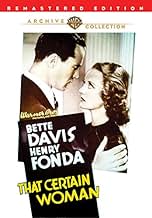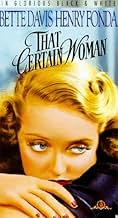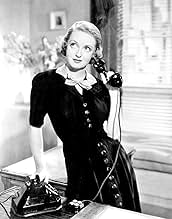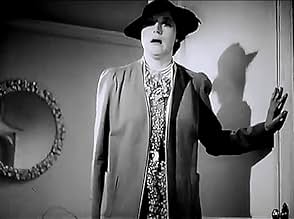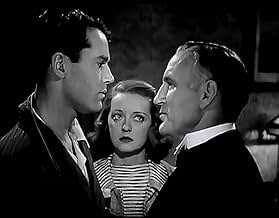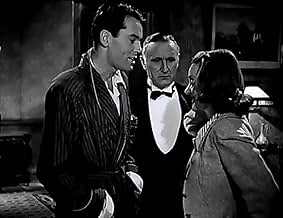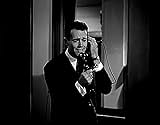AVALIAÇÃO DA IMDb
6,4/10
1,8 mil
SUA AVALIAÇÃO
Adicionar um enredo no seu idiomaMary Donnell, a young legal secretary with a past, elopes with a client's son, but his father has the marriage annulled without knowing she's pregnant.Mary Donnell, a young legal secretary with a past, elopes with a client's son, but his father has the marriage annulled without knowing she's pregnant.Mary Donnell, a young legal secretary with a past, elopes with a client's son, but his father has the marriage annulled without knowing she's pregnant.
- Prêmios
- 1 vitória no total
Katharine Alexander
- Mrs. Rogers
- (as Katherine Alexander)
Mary Philips
- Amy
- (as Mary Phillips)
Richard DeNeut
- Boy
- (as Dickie DeNeut)
John Hamilton
- American
- (cenas deletadas)
Edward Keane
- Opposing Counsel
- (cenas deletadas)
Avaliações em destaque
Audiences will groan at the character of Mary Donnell. Bette Davis is normally looking out for number one--and she's definitely her good old self in the first half of the movie. The widow of a gangster, Donnell has become a super-competent legal secretary for a respected attorney in a big firm. She fends off unwanted press attention and generally handles herself quite well as a tough single girl in the big city.
She becomes the mistress of her married boss at the law firm (although the Hays Office undoubtedly required the removal of any breath of sexual content here, it should be pretty obvious to all what is going on). In the second half of the movie, which focusses on Jack Merrick (Henry Fonda), whom Donnell has always loved, she achieves peaks of self-sacrifice that will send you staggering to the bathroom to throw up.
This is the sort of film that gives soap opera a bad name.
She becomes the mistress of her married boss at the law firm (although the Hays Office undoubtedly required the removal of any breath of sexual content here, it should be pretty obvious to all what is going on). In the second half of the movie, which focusses on Jack Merrick (Henry Fonda), whom Donnell has always loved, she achieves peaks of self-sacrifice that will send you staggering to the bathroom to throw up.
This is the sort of film that gives soap opera a bad name.
Was actually expecting quite a lot from 'That Certain Woman'. Yes it did sound very melodramatic, but there was a good deal of talent involved. Bette Davis gave many great performances, the best of which legendary status, as did Donald Crisp, who did a lot of big supporting roles in a varying filmography (but nearly always one of the better things about the not so good films). Henry Fonda was no stranger to good performances either and Edmund Goulding's other collaborations with Davis ranged from above average to great.
Not so sadly with 'That Certain Woman', which is perhaps their weakest collaboration. Through no fault of Davis, who is actually the best thing about it, there are other good things and it started off promisingly. All of that is unfortunately undermined by the film falling apart in the second half, where the amount of soap suds that lingers even after the film is over leaves a bitter aftertaste and the character writing certainly should have much more balanced and less simplistic.
Davis is as said the best thing about 'That Certain Woman' and is quite wonderful. A wide range of emotions very powerfully conveyed, even when the film falls apart. It is such a shock seeing Crisp play such an unpleasant character, he plays him very well and menacingly without overacting. The other female characters are sympathetically portrayed, especially Anita Louise.
'That Certain Woman' is lovingly made, with a real sense of mood in the photography and the production values overall have a lot of class. Max Steiner's score is sumptuous and swells and sweeps in distinctive fashion. Goulding directs tastefully in the first half, which is quite charming and affecting.
All that is undone in the second half, where the melodrama gets excessively heavy, the sentimentality makes for at two trips to the bathroom to try and wash out the soap suds welling up in the mouth and things do get silly to the point of ridiculousness. The amount of self-sacrifices Mary makes is so much that it becomes nauseating. The ending somehow rings false and is especially mawkish. The script gets increasingly stilted and soapy, and the momentum in the pace really goes.
Fonda looks uncomfortable in a role that really does not suit him, got the sense too that he himself knew that. Ian Hunter has too little to work with and doesn't have an awful lot of presence, at least he fares better than Fonda. Did have a problem with how the characters are written, especially the male ones, where too few of the characters have much dimension and are either written as too perfect or too cruel.
On the whole, watchable but with a lot that doesn't work. 5/10
Not so sadly with 'That Certain Woman', which is perhaps their weakest collaboration. Through no fault of Davis, who is actually the best thing about it, there are other good things and it started off promisingly. All of that is unfortunately undermined by the film falling apart in the second half, where the amount of soap suds that lingers even after the film is over leaves a bitter aftertaste and the character writing certainly should have much more balanced and less simplistic.
Davis is as said the best thing about 'That Certain Woman' and is quite wonderful. A wide range of emotions very powerfully conveyed, even when the film falls apart. It is such a shock seeing Crisp play such an unpleasant character, he plays him very well and menacingly without overacting. The other female characters are sympathetically portrayed, especially Anita Louise.
'That Certain Woman' is lovingly made, with a real sense of mood in the photography and the production values overall have a lot of class. Max Steiner's score is sumptuous and swells and sweeps in distinctive fashion. Goulding directs tastefully in the first half, which is quite charming and affecting.
All that is undone in the second half, where the melodrama gets excessively heavy, the sentimentality makes for at two trips to the bathroom to try and wash out the soap suds welling up in the mouth and things do get silly to the point of ridiculousness. The amount of self-sacrifices Mary makes is so much that it becomes nauseating. The ending somehow rings false and is especially mawkish. The script gets increasingly stilted and soapy, and the momentum in the pace really goes.
Fonda looks uncomfortable in a role that really does not suit him, got the sense too that he himself knew that. Ian Hunter has too little to work with and doesn't have an awful lot of presence, at least he fares better than Fonda. Did have a problem with how the characters are written, especially the male ones, where too few of the characters have much dimension and are either written as too perfect or too cruel.
On the whole, watchable but with a lot that doesn't work. 5/10
Bette Davis is "That Certain Woman" in this 1937 remake of "The Trespasser." Davis is the widow of a mobster killed in the Saint Valentine's Day massacre. Now she works for a businessman Lloyd Rogers (Ian Hunter) and uses the name Mary Donnell. She has two men in love with her: her boss Lloyd and a man from a wealthy family, Jack Merrick (Henry Fonda). Knowing who she is thanks to a news story, Merrick's dad (Donald Crisp) is violently opposed to the marriage, but she and Jack marry. They break up right after the honeymoon, thanks to the dad, but during the honeymoon, Mary conceived Jack Jr. Jack goes off to Paris and marries Flip (Anita Louise), not knowing anything about the baby. Meanwhile, the unhappily married Lloyd is hanging around Mary.
Very melodramatic and dated film in the Stella Davis sacrifice vein, with both Davis and Fonda giving excellent performances. Fonda in those days was Jane Fonda with a man's haircut - the resemblance is there for all to see. He's adorable. Also as an actor, he was more energetic and earnest; later, he became more internalized, and in my opinion, less interesting. Davis sports an ugly hair-do (except when she's either just waking up or going to bed).
Very likable stars, and the story will keep you interested, even if it is dated.
Very melodramatic and dated film in the Stella Davis sacrifice vein, with both Davis and Fonda giving excellent performances. Fonda in those days was Jane Fonda with a man's haircut - the resemblance is there for all to see. He's adorable. Also as an actor, he was more energetic and earnest; later, he became more internalized, and in my opinion, less interesting. Davis sports an ugly hair-do (except when she's either just waking up or going to bed).
Very likable stars, and the story will keep you interested, even if it is dated.
I actually liked this picture. The story loosely parallels that of Madame Butterfly...and if you see it in that light, it doesn't seem all that over the top. I wouldn't be a bit surprised if the writer had the idea of updating Madame Butterfly...I visually these guys in wrinkled shirtsleeves bending over their old Royal typewriters chomping on cigars..."Yeah...Madame Butterfly...that's the ticket...only she's not a prostitute, that won't work....but a fallen woman...but a noble one....she's a bootlegger's widow...yeah! that's the ticket...she marries a playboy, he dumps her, marries someone else...she waits for him....keep the faithful maid in the plot...has a kid....the husband comes back...remarried....she sends the kid off to live with her ex and then offs herself....yeah! It'll be a hit! Not a dry in the house."
I actually realized the similarity only in the last 15 minutes of the film when I got that awful yet familiar feeling in the pit of my stomach which always anticipates a mother's pending self-sacrifice. When Butterfly sees the American wife for the first time standing outside her little house on hill in Japan and realizes who she is and why she's there...it's really heartbreaking.
Anyway, despite the melodrama, the performances That Certain Woman are really very good, especially Davis's. She was a very intelligent actress, and understood what the camera would catch.
So, maybe you don't need to OWN this video, but I wouldn't disregard it entirely. Then go out and rent Frédéric Mitterrand's beautiful 1995 film of the opera. Heart-wrenching...
I actually realized the similarity only in the last 15 minutes of the film when I got that awful yet familiar feeling in the pit of my stomach which always anticipates a mother's pending self-sacrifice. When Butterfly sees the American wife for the first time standing outside her little house on hill in Japan and realizes who she is and why she's there...it's really heartbreaking.
Anyway, despite the melodrama, the performances That Certain Woman are really very good, especially Davis's. She was a very intelligent actress, and understood what the camera would catch.
So, maybe you don't need to OWN this video, but I wouldn't disregard it entirely. Then go out and rent Frédéric Mitterrand's beautiful 1995 film of the opera. Heart-wrenching...
This is a superior and under-rated "woman's picture" that really has all the elements of the classic weeper: star-crossed lovers, twists of fate, and self-sacrifice. It also has a sterling performance from Bette Davis which gives a strong indication of why she would soon be a superstar and regarded as the screen's best actress: Her belief in a character could suffuse it with passion and poignancy and transcend the shallowness of the accompanying story. She's supported by an excellent cast - Henry Fonda (in a basically thankless role), the ever-reliable Donald Crisp (her showdown scene with him oddly foreshadows similar scenes with Gladys Cooper in NOW, VOYAGER), Mary Phillips (in a role that in a later version would obviously have gone to Thelma Ritter), who was, at the time, Mrs. Humphrey Bogart (in the same year's MARKED WOMAN Davis would appear with Mayo Methot, the next Mrs. B., and Ian Hunter. Edmund Goulding, who excelled at this kind of thing, wrote and directed it - he would later direct Davis in two other notable soapers, DARK VICTORY (one of her most celebrated performances, as Judith Traherne), and THE GREAT LIE (for which Mary Astor won a Best Supporting Actress Oscar). It's all served up in the best Warner Bros. tradition, but doesn't seem to be as well-remembered as other such films of the era, such as MAGNIFICENT OBSESSION, STELLA DALLAS, or MY FOOLISH HEART.
Você sabia?
- CuriosidadesWith Bette Davis rising quickly through the ranks at Warner Brothers, she was able to choose her leading men, and for Cinzas do Passado (1937) she chose Henry Fonda. Their lives had intersected a decade earlier when they worked in the same New England summer stock company. Even before that portion of their lives, they had met when Fonda gave the 17-year-old Davis a tour of Princeton University. One night, Fonda later wrote, while he and a friend took Davis and her sister out for a tour of the campus by moonlight, he nervously gave Davis an innocent kiss on the lips. A few days later he received a letter from her: "I've told mother about our lovely experience together in the moonlight. She will announce the engagement when we get home." Fonda was so naïve that he wasn't sure at first whether this was a joke! Davis remembered and liked Fonda enough to request him for this film and then again for Jezebel (1938).
- Erros de gravaçãoThe screen shows a newspaper page with headlines, photographs, and a box in large type, all part of a full-page gangster story. However, only some of the text that can be seen around the edges is part of the story. The rest is "dummy" type, about clothes for college men or electrical equipment.
- Citações
Lloyd Rogers: [to Mary] Money! I've got loads of it, and I'm one of the unhappiest men in the world!
- Cenas durante ou pós-créditosThe opening credits roll up.
- ConexõesFeatured in Breakdowns of 1938 (1938)
- Trilhas sonoras'Cause My Baby Says It's So
(1937) (uncredited)
Music by Harry Warren
Played during the scene at the bar
Principais escolhas
Faça login para avaliar e ver a lista de recomendações personalizadas
- How long is That Certain Woman?Fornecido pela Alexa
Detalhes
- Data de lançamento
- País de origem
- Idioma
- Também conhecido como
- That Certain Woman
- Locações de filme
- Empresa de produção
- Consulte mais créditos da empresa na IMDbPro
- Tempo de duração1 hora 33 minutos
- Cor
- Mixagem de som
- Proporção
- 1.37 : 1
Contribua para esta página
Sugerir uma alteração ou adicionar conteúdo ausente

Principal brecha
By what name was Cinzas do Passado (1937) officially released in India in English?
Responda

